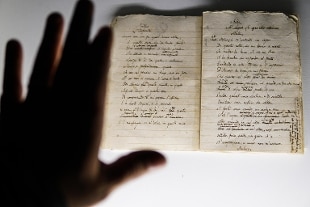- Leopardi was censored by the Austrians, "deserves the damnation"
- What if Leopardi was not born in Recanati, but in the Montelupone countryside?
- Leopardi's Infinito turns 200 and students recite it in piazza # 200infinito
- "This dear hill was always dear to me" ... Recanati celebrates the 200 years of Leopardi's Infinito
- Ministry of Culture buys correspondence from Ungaretti and letters from Leopardi
Share
20 January 2020 From the autographed papers of Giacomo Leopardi (1798-1837) kept at the National Library of Naples, an unknown and unpublished review emerges, probably dating back to the autumn of 1816. It is an accomplished text, in good copy and signed, but which the poet renounced to publish. However, the reviewed booklet, "The shadow of Dante", "vision" in triplets by Giuliano Anniballi, printed in Loreto in 1816 is also unknown.The discovery of the article, informs AdnKronos, is by Christian Genetelli, full professor of Italian literature and philology at the University of Friborg (Switzerland) and member of the scientific committee of the National Center of Leopardian Studies in Recanati. The scholar gives news of this in a small volume to be published in Milan in recent days at Led-Edizioni Universitari di Lettere Economia Diritto ("Palinsesti" series) entitled "An unpublished and unknown review by Giacomo Leopardi ('L'Ombra di Dante' ) ".
The Leopardian autograph is a simple sheet, written on the front and back. Genetelli's study explains the genesis, peculiarities and implications of the unpublished: he places it within a season of feverish activity for Leopardi, fresh from 'literary conversion', in which Dante's name takes a privileged place within his poetics of the primitive. Attention, of course, is also reserved to the involuntary co-protagonist, to the author of the "Shadow of Dante", of which the whole parable is traced: from the first steps in his native Urbino to the Rimini years of maturity and old age, now more than half of the nineteenth century, but always inspiring and exhaling fair classic air.
The discovery of this short article, explains Professor Christian Genetelli, thus comes "to enrich the corpus of Leopardi's works not on the side of the unfinished, of the note or of the sketch, but on that of the finished texts, ready for printing, also if they remained unpublished (and yet preserved and brought with them by the author to Naples, until his last home) ".

